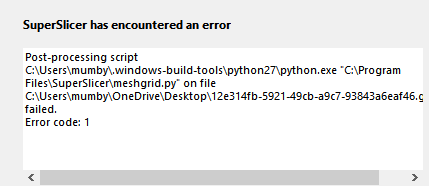Cura Script to Automatically Probe Only Printed Area
-
@Red-Sand-Robot
Double check the content of the script.
I just tried yesterday and was getting the same error.
The first time I downloaded, I right clicked the link and selected "download link" or some such.
Problem was it downloaded the whole HTML page, not just the python script. (DOH!)
After copying and pasting just the script content it worked fine. -
@Red-Sand-Robot, I would suggest to first run it manually from the command line. It will give you more information on what's going on. (after verifying that the script download is ok per OwenD's suggestion)
-
@zapta Command line? As in my computer or PrusaSlicer? Sorry, the programming side of things isn't my forte.
-
@Red-Sand-Robot, it seems that you work on windows. I meant commands types in the DOS window. I don't have here a Windows computer but others here may be able to explain it better.
-
@zapta Yes, I work on windows. Haven't made the jump to attempt to learn Linux or associated stuff yet though I suppose I should if I ever want to use a RPI for anything useful.
When I ran the script from the command prompt window, I received this output:
C:\Users\Jack>AppData\Local\Programs\Python\Python38-32\python.exe "C:\Users\Jack\Documents\3D Printing\PrusaSlicerScript\duet3d_automesh.py" usage: duet3d_automesh.py [-h] [--meshable MESHABLE] [--margin MARGIN] [--spacing SPACING] [--min_points {2,3,4,5,6,7,8,9,10,11,12,13,14,15,16,17,18,19,20,21,22,23,24,25,26,27,28,29,30,31,32,33,34,35,36,37,38,39,40,41,42,43,44,45,46,47,48,49}] [--max_points {2,3,4,5,6,7,8,9,10,11,12,13,14,15,16,17,18,19,20,21,22,23,24,25,26,27,28,29,30,31,32,33,34,35,36,37,38,39,40,41,42,43,44,45,46,47,48,49}] [--first_layer_start FIRST_LAYER_START] [--first_layer_end FIRST_LAYER_END] file_path duet3d_automesh.py: error: the following arguments are required: file_pathDoes that look like it is functioning correctly? I'm guessing that the
file_pathargument is talking about the .gcode file, but if not that would indicate an error with how I'm calling the script from what I understand. -
@zapta Figured out that my main issue was that I never changed the meshable area parameters to match my machine. I guess I just assumed when it says "default" that the script would also parse that stuff from the slicer, but in hindsight the script doesn't function that way, it only looks at the .gcode file after it has been output by the slicer.
Leaving output up as an example of what it looks like the user does not properly define the meshable area in regards to their machine. My machine has -100:100,-100:100 for a meshable area.
C:\Users\Jack>C:\Users\Jack\AppData\Local\Programs\Python\Python38-32\python.exe C:\Users\Jack\Documents\3D-Printing\PrusaSlicerScript\duet3d_automesh.py C:\Users\Jack\Documents\3D-Printing\Stuff\flex_tube_support2.gcode MESHABLE area: 30.0:280.0,30.0:280.0 Opening gcode file: C:\Users\Jack\Documents\3D-Printing\Stuff\flex_tube_support2.gcode Read 33095 lines Parsing state = ParsingState.WAITING_FOR_LAYER1 ; Automesh: begin layer 0 Parsing state = ParsingState.IN_LAYER1 ; Automesh: begin layer 1 Parsing state = ParsingState.LAYER1_DONE First layer print areas: -13:13,-48:48 printArea: -13:13,-48:48 Traceback (most recent call last): File "C:\Users\Jack\Documents\3D-Printing\PrusaSlicerScript\duet3d_automesh.py", line 371, in <module> main() File "C:\Users\Jack\Documents\3D-Printing\PrusaSlicerScript\duet3d_automesh.py", line 218, in main mesh_area.clip_to(MESHABLE_AREA) File "C:\Users\Jack\Documents\3D-Printing\PrusaSlicerScript\duet3d_automesh.py", line 165, in clip_to self.x_span.clip_to(other_rect.x_span) File "C:\Users\Jack\Documents\3D-Printing\PrusaSlicerScript\duet3d_automesh.py", line 126, in clip_to self.__check() File "C:\Users\Jack\Documents\3D-Printing\PrusaSlicerScript\duet3d_automesh.py", line 105, in __check fatal_error(f'Invalid range value: {self}') File "C:\Users\Jack\Documents\3D-Printing\PrusaSlicerScript\duet3d_automesh.py", line 83, in fatal_error raise Exception('Fatal error: ' + message) Exception: Fatal error: Invalid range value: 30.0:23 -
@Red-Sand-Robot, I think we are almost there

Can you post here your file flex_tube_support2.gcode ? I will try to run it myself and check that error.
Edit: to set your own meshable area, add to the command line the following flag:
--meshable=-100:100,-100:100
-
@zapta Would
--meshable=-100:100,-100:100go after the output path specification in PrusaSlicer? I just manually changed the default in the script.parser.add_argument('--meshable', default="-100:100,-100:100", help='Bed meshable area x1:x2,y1:y2')Here is the .gcode file. I have my 0,0 point in the center of the build plate. I know that you previously added support for negative positional values so I don't think that would be the issue
flex_tube_support2.gcode -
@Baenwort said in Cura Script to Automatically Probe Only Printed Area:
Does this bring it closer to working for Delta's? Or at least probing a square area of the circular bed?
Yes, this makes it usable for delta's, because
"For Cartesian printers, specify minimum and maximum X and Y values to probe and the probing interval. For Delta printers, specify the probing radius. If you define both, the probing area will be the intersection of the rectangular area and the circle. "
https://duet3d.dozuki.com/Wiki/Gcode#Section_M557_Set_Z_probe_point_or_define_probing_grid -
@Red-Sand-Robot, the change that you made in the program, changing the default meshable area to -100:100 is correct. Just remember to apply it again if you will download a newer version of this script.
I run your gcode file and got this which looks ok to me
MESHABLE area: -100.0:100.0,-100.0:100.0 Opening gcode file: flex.gcode Read 33099 lines Parsing state = ParsingState.WAITING_FOR_LAYER1 ; Automesh: begin layer 0 Parsing state = ParsingState.IN_LAYER1 ; Automesh: begin layer 1 Parsing state = ParsingState.LAYER1_DONE First layer print areas: -13:13,-48:48 printArea: -13:13,-48:48 Will use 3 x 4 mesh points Marker: M557 X-23:23 Y-58:58 P3:4 Inserted: M557 X-23:23 Y-58:58 P3:4Does it work for you now or are there still problems?
Edit: for your question the -- flags should be specified immediately after the .py script name.
-
@tcj Great! I'll give it a try on my next print.
Do you think it will use the Delta probe interval for the new area or one specified by the gcode?
-
@tcj So I'm still learning Cura after switching from using MatterControl since I got my Rostock v3. I tried adding the duet3d_automesh.py from zapta's github to the scripts area of the postprocessing folder of Cura's plugin folder.
I do have Python 3 installed (3.8.3 to be exact) but this seems to make no difference to it showing up in Cura.

-
@Baenwort, can you provide a little bit more info. E.g. what computer you are using (windows? mac? linux?) and how you set up the script in cura.
-
Window's but I also tried it with a Ubuntu 20.04 Cura install. Both are Cura 4.6 and the OP and most post processing scripts direct placing the .py file in the plugin post processing directory.
I can get you the exact tree when I get.back to my home tonight.
-
I have installed this into Cura 4.62 and using on my Railcore II. When it goes to run it always defines my X end point as being 1800.
M557 X103.850:1800.000 Y115.304:164.705 S10.000 ; Leveling mesh defined by LevelingMeshOptimizer
Railcore of course doesn't like this and then just skips the mesh:
Error: M557: bad grid definition: Too many grid points; suggest increase spacing to 44.2mm
Error: G29: No valid grid defined for bed probingIs there something I am doing wrong?
-
@sandoz said in Cura Script to Automatically Probe Only Printed Area:
Is there something I am doing wrong?
My guess is that there is a X1800 somewhere in the gcode that is picked by the script. Can you post the gcode file?
-
@zapta Alright.. using your comments as a place to start I found that having my Jerk control turned on in Cura led to some M566 x1800 commands that it was picking up. I turned off Curas control and just set it in the machine settings and now it slices properly.
-
@sandoz, the code is dump, looking for X<number> in the text regardless of the command, may even look in comments, I am not sure. If needed, it can be restricted it to a set of commands such as G0, G1, etc.
-
I wanted to set the probe spacing according to the size of the model. If it's <= 100 spacing should be 20, if it's >100 spacing should be 50.
Need to find the proper size/spacing values, but if anyone is interested, here's the diff:
128,135d127 < sizeX = int(bounds['X']['max'] - bounds['X']['min']) < sizeY = int(bounds['Y']['max'] - bounds['Y']['min']) < < if sizeX >= 100 or sizeY >= 100: < bounds['S'] = 50 < else: < bounds['S'] = 20 < 137c129 < gridNew = 'M557 X%d:%d Y%d:%d S%d' % ( --- > gridNew = 'M557 X%d:%d Y%d:%d' % ( 140d131 < bounds['S'], 147c138 < linesNew.append(re.sub(r'^M557 X\d+:\d+ Y\d+:\d+ S\d+', gridNew, line, flags=re.MULTILINE)) --- > linesNew.append(re.sub(r'^M557 X\d+:\d+ Y\d+:\d+', gridNew, line, flags=re.MULTILINE)) -
I'm trying to get this working in superslicer but get an error. Can anyone help?

in post-processing script
C:\Users\mumby\.windows-build-tools\python27\python.exe "C:\Program Files\SuperSlicer\meshgrid.py"my start gcode (added M557)
M557 X20:292 Y15:300 P5 ; define mesh grid M104 S[first_layer_temperature] ; set extruder temp M140 S[first_layer_bed_temperature] ; set bed temp G21 ; metric values M190 S[first_layer_bed_temperature] ; wait for bed temp G28 ; home all G32 ; Run mesh grid compenstion G92 E0 F100 ; reset extruder G1 Z10 F3000 ; move z up little to prevent scratching of surface M109 S[first_layer_temperature] ; wait for extruder temp M98 P"0:/macros/Filament/Clean Nozzle" ; Clean nozzle macro M98 P/macros/Filament/Purge ; Run nozzle purge macro G1 E-3 F2000 ; Retract 3mm filament G92 E0 ; reset extruderthis script itself (coped from an earlier post here)
#!/usr/bin/env python3 """Simplify3D post-processing script for RepRap firmware printers which dynamically defines the mesh grid dimensions (M557) based on the print dimensions. {1} Usage: {1} Within Simplify3D > Process Settings > Scripts > Post Processing > add the following command: python3 <script_location>/meshgrid.py "[output_filepath]" Starting script must contain M557 Command (ie M557 X30:300 Y30:300 P20). {1} Args: {1} Path: Complete path to the gcode file created by Simplify 3d. {1} Requirements: {1} Tested using Python 3.8.1. {1} Credit: {1} Adapted from code originally posted by CCS86 on https://forum.duet3d.com/topic/15302/cura-script-to-automatically-probe-only-printed-area?_=1587348242875. {1} """ import sys import re import math def main(filename): try: _s3dFile = open(filename, encoding='utf-8') except TypeError: try: _s3dFile = open(filename) except: print("Open file exception. Exiting meshgrid.py.") sys.exit() except FileNotFoundError: print('File not found. Exiting meshgrid.py.') sys.exit() lines = _s3dFile.readlines() _s3dFile.close() linesNew = calcBed(lines) _s3dFileNew = open(filename, "r+") _s3dFileNew.seek(0) _s3dFileNew.truncate() for element in linesNew: _s3dFileNew.write(element) _s3dFileNew.close() return def calcBed(lines): bounds = findBounds(lines) bed = findBed(lines) for axis in bounds: if bounds[axis]['max'] - bounds[axis]['min'] < bed[axis]: print(f'Success: {axis} mesh is smaller than bed') else: print('Error: Mesh is larger than bed. Exiting meshgrid.py.') sys.exit() for limit in bounds[axis]: if limit == 'min': if (bed[axis] / 2) - bounds[axis][limit] > 0: print (f'Success: {axis} {limit} coordinate is on the bed.') else: print (f'Error: {axis} {limit} coordinate is off the bed. Exiting meshgrid.py.') sys.exit() if limit == 'max': if (bed[axis]) - bounds[axis][limit] > 0: print (f'Success: {axis} {limit} coordinate is on the bed.') else: print (f'Error: {axis} {limit} coordinate is off the bed. Exiting meshgrid.py.') sys.exit() return fillGrid(bounds, lines) def findBed(lines): bed = { 'X': 0, 'Y': 0, } for line in lines: if line.startswith('; strokeXoverride,'): bed['X'] = int(re.search(r'\d.+\S', line).group()) elif line.startswith('; strokeYoverride,'): bed['Y'] = int(re.search(r'\d.+', line).group()) break return bed def findBounds(lines): bounds = { 'X': {'min': 9999, 'max': 0}, 'Y': {'min': 9999, 'max': 0}, } parsing = False for line in lines: if line.startswith('; layer 1,'): parsing = True continue elif line.startswith('; layer 2,'): break if parsing: # Get coordinates on this line for match in re.findall(r'([YX])([\d.]+)\s', line): # Get axis letter axis = match[0] # Skip axes we don't care about if axis not in bounds: continue # Parse parameter value value = float(match[1]) # Update bounds bounds[axis]['min'] = math.floor(min(bounds[axis]['min'], value)) bounds[axis]['max'] = math.ceil(max(bounds[axis]['max'], value)) return bounds def fillGrid(bounds, lines): # Fill in the level command template gridNew = 'M557 X%d:%d Y%d:%d' % ( bounds['X']['min'], bounds['X']['max'], bounds['Y']['min'], bounds['Y']['max'], ) # Replace M557 command in GCODE linesNew = [] for line in lines: if line.startswith('M557'): linesNew.append(re.sub(r'^M557 X\d+:\d+ Y\d+:\d+', gridNew, line, flags=re.MULTILINE)) else: linesNew.append(line) return linesNew if __name__ == '__main__': if sys.argv[1]: main(filename = sys.argv[1]) else: print('Error: Proper s3d post processing command is python3 <script_location>/meshgrid.py "[output_filepath]". Exiting meshgrid.py.') sys.exit() -
 undefined Phaedrux referenced this topic
undefined Phaedrux referenced this topic